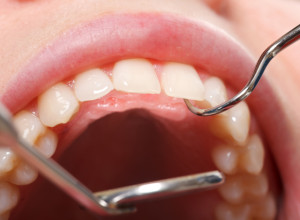 It’s no secret that a healthy mouth is often a sign of a healthy body, and that many health issues may first show up at a dental checkup. Here are five key indicators your dentist will look for during an oral health exam.
It’s no secret that a healthy mouth is often a sign of a healthy body, and that many health issues may first show up at a dental checkup. Here are five key indicators your dentist will look for during an oral health exam.
Today’s guest blogger is Dr. Joumana Basha, a general dentist with 1st Family Dental of Arlington Heights. Dr. Basha enjoys meeting and providing dental care for families and children.
Five Signs of a Healthy Mouth
Healthy Gums
Take a good close look at your gums. They should be pink and firm to the touch, not red or white, and not swollen or tender. Teeth should be seated firmly and should not feel wiggly or loose. Gums should sit flush with the teeth, with no flaps, pockets, or places where they appear to be receding from the tooth. Flossing daily helps to keep gums healthy, and prevent pockets and places for bacteria to collect and cause damage, decay, and bad breath. Your dentist will review your x-rays and probe your gums to check for pockets in the gums. Healthy gums are a leading indicator of a healthy body. You can read about the importance of gum health and treatment in our recent blog post.
 Strong Teeth & Dental Restorations
Strong Teeth & Dental Restorations
At each exam, your dentist will check your teeth for strength and condition, including teeth that have restorations such as fillings or teeth with crowns including dental implants. Grinding or clenching (bruxism) is a common issue that can increase the wear on teeth and restorations, including teeth with amalgam fillings. Decay, as well as tiny cracks or other issues with teeth and restorations may not always be visible to the naked eye. Dental x-rays and a thorough exam may help detect issues before they become painful and often more difficult to treat. If your doctor detects a potential issue, they will show you and explain what they see as well as recommend treatment options to help keep your teeth as strong and healthy as possible.
Pleasant or Neutral Breath
A healthy mouth means naturally pleasant or neutral breath. You can test this easily at home. Floss between a couple of your teeth, or scrape your tongue with a fingernail and take a sniff. This is a more realistic sense of what your breath may smell like once toothpaste and mouthwash have faded for the day. The presence of bacteria and food particles is directly related to persistent bad breath. Bad breath can also be an indicator of other health issues such as diabetes, and even sinus issues. Certain medications that cause dry mouth can also cause unpleasant breath. Your dentist can discuss options to help relieve dry mouth symptoms. The best possible way to keep your breath pleasant is with good brushing and flossing habits and regular dental checkups.
 Proper Jaw Alignment & Tooth Spacing
Proper Jaw Alignment & Tooth Spacing
Your dentist examines not just your teeth, but how they fit together in your mouth and jaw as a whole. Teeth that are straight and aligned properly are much easier to brush and floss, meaning better breath and fewer places for cavities or gum disease to develop with proper home care. Crowding, also known as a “malocclusion,” can impact chewing and normal digestion, and may be related to bruxism (clenching or grinding), gum disease, jaw disorders such as Temporomandibular Joint Disorder (TMJ), migraines or other neurological symptoms, and even the overall shape of your face. Your dentist may recommend a consultation with one of our Board-Certified Orthodontists. You can learn more about the importance of braces and orthodontics by clicking here.
Healthy Oral Tissues
An oral health exam covers much more than just teeth! Many whole-body health issues have symptoms that may manifest in the mouth, such as diabetes, cardiovascular diseases, and thyroid issues. Your dentist is trained to examine the entire mouth, including the tongue, lips and cheeks. Healthy oral tissues are often pink, firm and moist. Issues may appear in the form of dry mouth, infections such as thrush, painful sores, swelling, or tenderness. Your dentist is also trained to spot warning signs that may point to oral cancer and other serious issues. We believe it is always best to err on the side of caution. If your dentist sees anything of concern in an exam, he or she will discuss this with you and recommend you see your regular physician for a follow up.
A healthy smile goes far beyond surface appearances. Oral health has a direct impact on self-confidence, social and professional relationships, and is truly the mirror of the body. Give us a call or stop by any of our locations to schedule an appointment or simply to learn more about how a healthy mouth and teeth can be the key to your overall health.


 Strong Teeth & Dental Restorations
Strong Teeth & Dental Restorations Proper Jaw Alignment & Tooth Spacing
Proper Jaw Alignment & Tooth Spacing
1 Comment
Leave your reply.